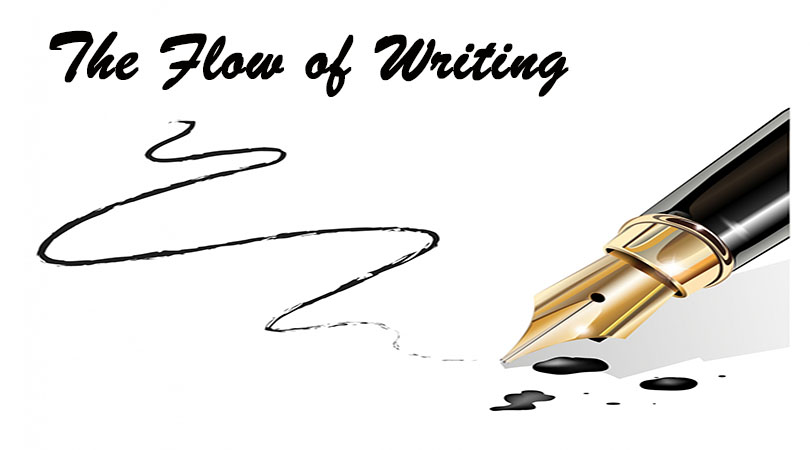Editors, publishers, literary agents, and readers love edgy and quirky writing – but not at the expense of writing flow.
— Laurie Pawlik-Kienlen
Flow in writing is difficult to define, but readers always seem to recognize it. A flowing science fiction novel sucks the reader into the story, makes the unbelievable logical and prevents the poor reader from putting the book down until the last word passes into their brain long after dark.
So, if defining flow is difficult, perhaps the opposite is comprehensible. Choppy, telegraphic, terse, repetitive, dense, lean, or clipped are not terms of affection used by readers. You want terms like flowing, engaging, and lucid (see the example below).
Tips to Improve Flow
- Balance your style between unconventional and straightforward. Not so unconventional as to be weird and not so straightforward as to be boring.
- Make transitions between paragraphs and sentences logical. When editing, this may require reordering which is preferable to explaining.
- Analyze your writing scientifically. Find and replace repetitive sentence beginnings such as pronouns, gerunds (verbs functioning as nouns — they end in ‘ing) or names.
- Vary sentence length — become comfortable with the grammar of phrases, clauses and commas, and use connectors to improve flow (see below).
- Break editing into two parts: 1) content and 2) mechanics. Most editors and writers can’t reliably do both at the same time.
- Read your work out-loud. Why? Because well constructed sentences can be read easily at a conversational pace. That means a reader can understand them without pausing or puzzling over meaning.
- Trim the fat. Readers will skip filler, ignore “blah-blah-blah”, flip the page and possibly toss the book in the real or electronic garbage. Delete what the reader can infer — resist the urge to explain (RUE) and don’t treat readers like dummies.
- Occasionally, break paragraphs for emphasis. In fact, a stand-alone sentence at the end of a chapter is powerful.
- Minimize nominalization which is the grammatical conversion of verbs or adjectives to nouns. For example, discover converts to discovery or careless converts to carelessness. Try to make sentences with the unconverted word.
- Passive voice is appropriate when the intent is to obscure the doer of action: “mistakes were made.” If a character in a book is a politician, a diplomat or is shy then the passive voice is fine. However, littering a book with unnecessary passive voice should be avoided because it reduces the sense of ongoing action.

Connectors
Obviously, if you are going to create interesting and varied sentences, grammatical connectors are a necessity. Faculty at Michigan State University compiled a comprehensive list of connectors. Below is an abridged list:
Subordinate conjunctions
After, although, as, as if, as long as, as much as,
as soon as, as though, because, before, even if, even though,
how, if, in as much, in order that, lest, now, provided (that),
since, so that, than, that, though, till, unless, until, when, whenever, where, wherever, while.
Conjunctive adverbs
Accordingly, also, anyway, again, besides, certainly, consequently,
contrarily, finally, further, furthermore, elsewhere, hence,
henceforth, however, in contrast, incidentally, indeed, instead,
likewise, meanwhile, moreover, namely, nevertheless, next,
nonetheless, now, otherwise, rather, similarly, so, subsequently,
still, that is, then, thereafter, therefore, thus, undoubtedly, yet.
Links to other blogs
- 4 Ways to Keep Your Sentences From All Sounding the Same
- Why Your Writing Sounds Weird (And What You Can Do About It)
Example
Gabriel García Márquez won the Nobel prize for literature in 1982 after publication of his fantasy book “One Hundred Years of Solitude”. Scholars praise the book for its long and flowing sentences. Flow is hard to define, so here are a few sentences from the book to make the idea clear:
Many years later, as he faced the firing squad, Colonel Aurelaiano Buendia was to remember that distant afternoon when his father took him to discover ice.
He sent it to the government, accompanied by numerous descriptions of his experiments and several pages of explanatory sketches, by a messenger who crossed the mountains, got lost in measureless swamps, forded stormy rivers, and was on the point of perishing under the lash of despair, plague, and wild beasts until he found a route that joined the one used by the mules that carried the mail.
That spirit of social initiative disappeared in a short time, pulled away by the fever of the magnets, the astronomical calculations, the dreams of transmutation, and the urge to discover the wonders of the world.
From a clean and active man, Jose Arcadio Buendia changed into a man lazy in appearance, careless in his dress, with a wild beard that Ursula managed to trim with great effort and a kitchen knife.
Pietro Crespi was young and blond, the most handsome and well-mannered man who had ever been seen in Macondo, so scrupulous in his dress that in spite of the suffocating heat he would work in the brocade vest and heavy coat of dark cloth.
“You’re lucky because you know why,” he answered. “As far as I’m concerned, I’ve come to realize only just now that I’m fighting because of pride.”
“You can tell me later,” she said. “I forgot that today’s the day to put quicklime on the anthills.”

